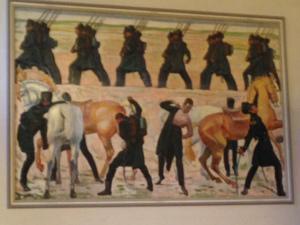I am in York for the General Synod of the Church of England – a session that lasts from this afternoon until next Tuesday. The agenda was varied in order to allow for a debate on a motion proposed by the Archbishop of Canterbury in the wake of the EU Referendum. The Synod was encouraged by the Archbishop to look forward, not back.
I stood throughout the substantive debate, but was not called to speak – a little odd and frustrating given that I lead on Europe for the bishops in the House of Lords and chair the Meissen Commission, whose new German co-chair (Landesbischof Ralf Meister of Hanover) had just addressed the Synod.
Much of the debate was good, some was predictable. What was obvious, however, was how few of the ills attributed to the decision by 17million people to vote to leave the EU actually have/had nothing whatsoever to do with the EU. At some point this has to be named. If people wanted to express alienation for the political discourse or protest at the behavior of Westminster, then the EU should not have been the target.
That said, the vote is a fact on the ground and we now need to get on with the consequences of the result.

Had I spoken in the debate I would have drawn attention back to a less introspective place. The European project had distinctively Christian origins and emerged from a Christian-driven post-war drive to create relationships that would prevent intra-European conflict in the future. Schumann did not dream up his vision from nowhere. So, the debate going forward has to do not only with economics, markets, jobs and currency values, but also with culture, education, hope and integration.
It is not insignificant that a group of German and British Christians exchanged visits as Europe “sleepwalked” (Christopher Clark) its way towards what was to be the First World War. As the world collapsed around them within a few years, the relationships continued. Enemies knew that they were friends because they were untitled by the cross and resurrection of Christ. In the run-up to what became the Second World War it was also relationships between Christians that held while the nationalisms screamed their allegiances. It wasn't just Bishop George Bell and Dietrich Bonhoeffer who kept the fires of love burning amid the conflagration of an 'Enlightened' continent.
So, in looking forward to what might come next for the UK and its place in Europe (if not in the EU), we might just learn from such a brief look back. It is the relationships that matter. And they matter more now, perhaps, than they did three weeks ago.
Church of England dioceses often have strong partnerships with Anglican dioceses around the world – often in exotic or 'other' places. Quite right, too, and very important. Trying to get links with European dioceses has proved more difficult because there is an assumption that “they” don't need us and, anyway, we know them already. But, this is simply wrong. There has never been a greater need for us to build strong relationships and partnerships with European Christians and churches than there is today. It is the relationships that sustain when everything else collapses – and the future of Europe looks more fragile today than it did just a few weeks ago.
I would say this, wouldn't I? After all, I am a europhile. I speak several European languages. I have strong friendships across Europe. I co-chair a European ecumenical body (the Meissen Commission). But, at risk of repetition, I say:
- Now is not the time to diminish our investment in European ecumenical work, but to grow it.
- Now is the time to create, build and strengthen sustainable relationships with European churches and Christians.
- Now is not the time to look just at what is happening in our own islands, but to look through the lens of those on the continental mainland.
- Now is the time to ask what we can contribute to the future of Europe and not just what we can gain from it (or from leaving the EU).
- Now is the time to do the step-by-step, hard work of building relationships and making reconciliation a reality – not just in the divided communities of the UK, but also across the continent.

